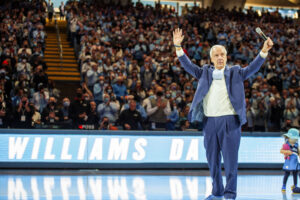This summer marks the 20-year anniversary of Coach Roy Williams’ return to Chapel Hill. What can North Carolina learn from his great tenure?
On April 14, 2003, the trajectory of UNC Men’s Basketball changed decisively. A little under six years after legendary Head Coach Dean Smith shocked the Chapel Hill faithful by retiring, the Tar Heels made a splash by bringing Roy Williams home to coach his alma mater. Despite making Final Fours in both 1998 and 2000, the interval years between Smith’s departure and Williams’ arrival were defined by inconsistency culminating in a 2002-2003 season that saw the program hit rock bottom.
It’s easy to forget, but not only were the results on the court poor, but the North Carolina reputation was reeling in a way it hadn’t in almost thirty years. Three scholarship basketball players transferred, something almost unprecedented for a big program at this time in college basketball. Obviously, time has been unkind to the Matt Doherty (Head Coach of UNC from 2000-2003) era, but he did leave one thing behind; a terrific Freshman class, led by Sean May, Raymond Felton, and Rashad McCants. This was all Williams needed to return the program to the top of the sport.
In order to properly contextualize the predicament North Carolina currently finds itself in, it is essential to understand exactly what Williams did for the Tar Heel program. As George Santayana once wrote, “To know your future, you must know your past.” It’s easy to unintentionally diminish Williams’ impact by narrowing it down to just his coach or recruiting. These aspects did matter, of course. But what Williams did more than anything is bring North Carolina basketball into the modern world.
When Williams returned to Chapel Hill, the sport had evolved well past the one Dean Smith coached for 36 seasons. Smith, an all-time great coach for the era he coached in, emphasized control, highlighted by his four corners offense that saw his teams pass the ball around as long as it took to create the best possible shot attempt. By 2003, the game had begun to open up with a greater emphasis on pace and shooting. In the 2004-2005 season that saw Williams win his first (of three) national championship in just his second season at North Carolina, the Tar Heels were one of the fastest teams in the nation with big men like Jawad Williams and Marvin Williams opening up the court with an ability to shoot the 3-pointer North Carolina faithful had not seen from forwards. Williams was not perfect, but he was fantastic and, more importantly, just what the University of North Carolina needed.
Why is this relevant? Because life is cyclical and basketball did not stop evolving in 2003. The parallels between the Tar Heel program in 2003 and 2023 are actually quite staggering. Just as it would have been unreasonable to expect the late Dean Smith to change his ways towards the end of his run, Williams also remained the same until the end. As a result, North Carolina has, once again, fallen behind the times. This time both on and off the court. On the court, new Head Coach Hubert Davis has taken the role of Doherty, importing his predecessor’s insistence on playing two big men regardless of their ability to shoot. But basketball has become almost positionless, and shooting is even more vital.
The face of this has been recently departed forward Leaky Black. Black, who had an admirable five-year career in Chapel Hill, certainly looked the part of a forward. In a lot of ways he was. He was an excellent defender and could, at times, be a menace around the rim. But not only was Black inefficient from the perimeter (his 3-point percentage at UNC was below 30%), but he also was not a willing shooter allowing defenses to sag off him. Despite this, Davis played him almost exclusively at Small Forward during his last two years at UNC. This worked when the Power Forward was sharp-shooting Brady Manek as it allowed the two to almost flip-flop their positional duties, but it also showcased a lack of feel for the pulse of the sport. Basketball is hardly a series of independent actions, it is fluid and decisions have compounding effects.
This is hardly a call for Coach Davis’ job. That would be, frankly, ridiculous. He’s been the Head Coach in Chapel Hill for just two seasons and in one of them he led the program to the national championship game. Additionally, he deserves the chance to grow with the great recruiting class he’s bringing in. But Davis has to follow in Williams’ footsteps by, ironically, distancing himself from him. Williams wasn’t great because he was a Dean Smith clone. No, what made him one of the best coaches in college basketball history was a willingness to identify how the sport was evolving and forge his own path. For Williams it was pace. What will Davis’ defining change be? Or will he go the way of Doherty and be forever known as the former player who merely served as a bridge between two eras?
Only time will tell.

Jan 29, 2022; Chapel Hill, North Carolina, USA; Former North Carolina Tar Heels head coach Roy Williams was honored during halftime at Dean E. Smith Center. Mandatory Credit: Bob Donnan-USA TODAY Sports